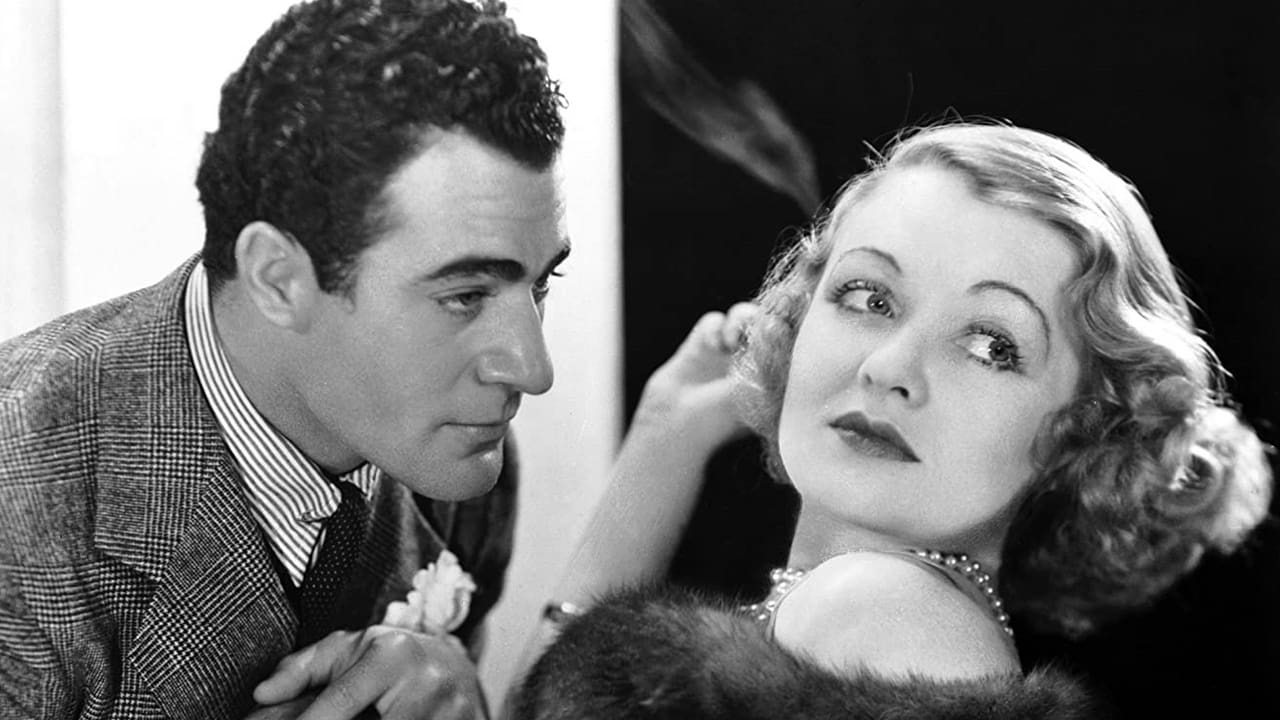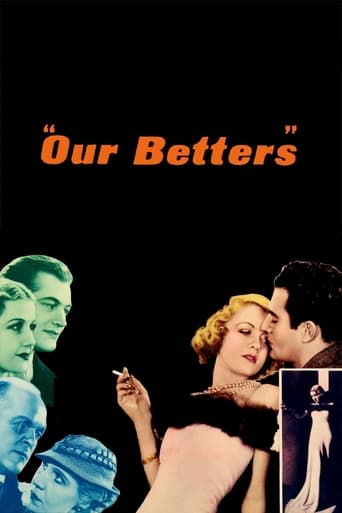Ketrivie
It isn't all that great, actually. Really cheesy and very predicable of how certain scenes are gonna turn play out. However, I guess that's the charm of it all, because I would consider this one of my guilty pleasures.
Voxitype
Good films always raise compelling questions, whether the format is fiction or documentary fact.
Billie Morin
This movie feels like it was made purely to piss off people who want good shows
Francene Odetta
It's simply great fun, a winsome film and an occasionally over-the-top luxury fantasy that never flags.
judy t
Here we have a comedy about 3 American heiresses who married into British aristocracy and how they coped with their loveless marriages. Of the 3, Pearl/Bennett has coped especially well, having made herself the leader of the Smart Set. But her success as a titled lady of leisure is a lot of hard work. While Maugham's story is passe today, as it may have been in 1933, still, it's very entertaining, loaded with laughs and chuckles. Bennett is superb. She is so much fun to watch as she gets herself into trouble and then, against the odds, gets herself out. Drawing-room comedy suits her and is the direction she should have continued to travel. Bennett would have been wonderful as Amanda in Coward's "Private Lives", but MGM's Thalberg owned the rights, and in 1931, while Bennett was playing suffering womanhood, Shearer played Amanda.Gilbert Roland was cast as the gold digger and did very well in a role that others, including Bennett's frequent costar, Joel McCrea, would have found impossible to play. The Duchesse demonstrates that furs and a little tricorn hat produce the illusion of beauty, if not youth.Ernest, necessary to the plot, makes a surprise appearance at the end of the film, in a scene exactly as Maugham wrote it. However, while Maugham's stage directions describe Ernest as "overwhelmingly gentlemanly . . . speaks in mincing tones" it does not say that his face was a smear of eye shadow and lipstick. What possessed Cukor anyway? Ernest is a likable character and doesn't need garish makeup to deliver the very funny lines Maugham wrote for him.The opening 2 scenes with husband George were not in the play. Apparently they were added to provide motivation as to why Pearl is the way she is and to make Pearl/Bennett sympathetic to audiences. Was this ruse successful? Variety's reviewer wrote, "Miss Bennett goes wicked early and stays that way to the finish. That she shows no sign of repenting or changing her ways will be difficult to justify with many of her best customers." Bennett's box-office popularity was slipping away. She had to escape the baby formula that made her a Star and change her image in order to attract new fans without losing her old fans. This was a difficult problem which Our Betters did not solve.This film will not get boring with repeat viewings. In spite of its imperfections, I intend to watch it repeatedly. After 82 years, the comedy and Bennett are still bright. Therefore, it rates a 10.
MartinHafer
Pearl is a rich American who is marrying into British royalty. However, on her wedding night, she learns that her husband has no interest in her--just her money. And, he has a lover. So, instead of leaving him and asking for an annulment, she decides to dive into the decadent lifestyle of these idlers. She flaunts morality and lives for fun and her own sexual conquests. All in all, her friends are a very vacuous crowd.At first, I thought all this was quite interesting and a nice commentary about the British aristocracy. However, after a while it all began to drag because the film was so very talky and mannered. Too many people talking as if they are in an amateur acting class on 'let's do British accent day'. All in all, it became a bore and lost me. One of the worst of these silly performances was by Duchess Minnie (Violet Kemble Cooper)--and it often lacked realism. Of course, this could also be said about several others in this dull film. Yes, it has its moments--but not nearly enough to make it worth seeing--even the chance to see Ernest near the end of the film!By the way, about a decade after this film, Bennett and Gilbert Roland (who was also in this film) were married. They made two films together--both in 1933--"Our Betters" and "After Tonight".
jotix100
W Somerset Maughan, the influential English writer and playwright, was a man that knew a lot about the upper crust society of England. His delightful play about rich people living privileged lives, serves as the basis of this movie that is not seen often. The film is greatly helped by the direction given by George Cukor, a man who was in his element eliciting excellent performances of his cast.Best of all is Constance Bennett, a luminous presence in the movies of those days that was at the height of her popularity when "Our Betters" was made. Ms. Bennett had a beautiful figure and she could act. In the film she plays Lady Pearl Grayston, an American living in London.The other extraordinary performance is given by Violet Kemble, who as Minnie, the Duchess of Surae, shows quite a range as the silly old woman in love with a young playboy. Ms. Kemble is enormously funny at one point, then, when she discovers her Pepi's infidelity, she is quite crossed with her hostess for taking such a step right in front of her.The others in the cast are quite good. Phoebe Foster, the gorgeous Anita Louise, Gilbert Roland, Alan Mowbray, and in an over the top performance in the last sequence by Tyrell Davis who, as a flighty Ernest, shows up made up and with all the best intentions to make the Duchess learn how to dance the tango.A delightful comedy thanks to Mr. Maughan and Mr. Cukor.
aberlour36
This is a delightfully bitter and witty play by Maugham, adapted to film almost exactly as it appeared on stage. Kemble as Minnie steals the show. And the last scene, between Minnie and the dance instructor, is simply hilarious. Charles Starrett, later a Western star in "B" movies, is wooden, and poor Gilbert Roland doesn't have a lot to work with in the script. But the others sparkle and shine, telling us what sophisticated light comedy can be at its best. What a shame this has not appeared on VHS.

